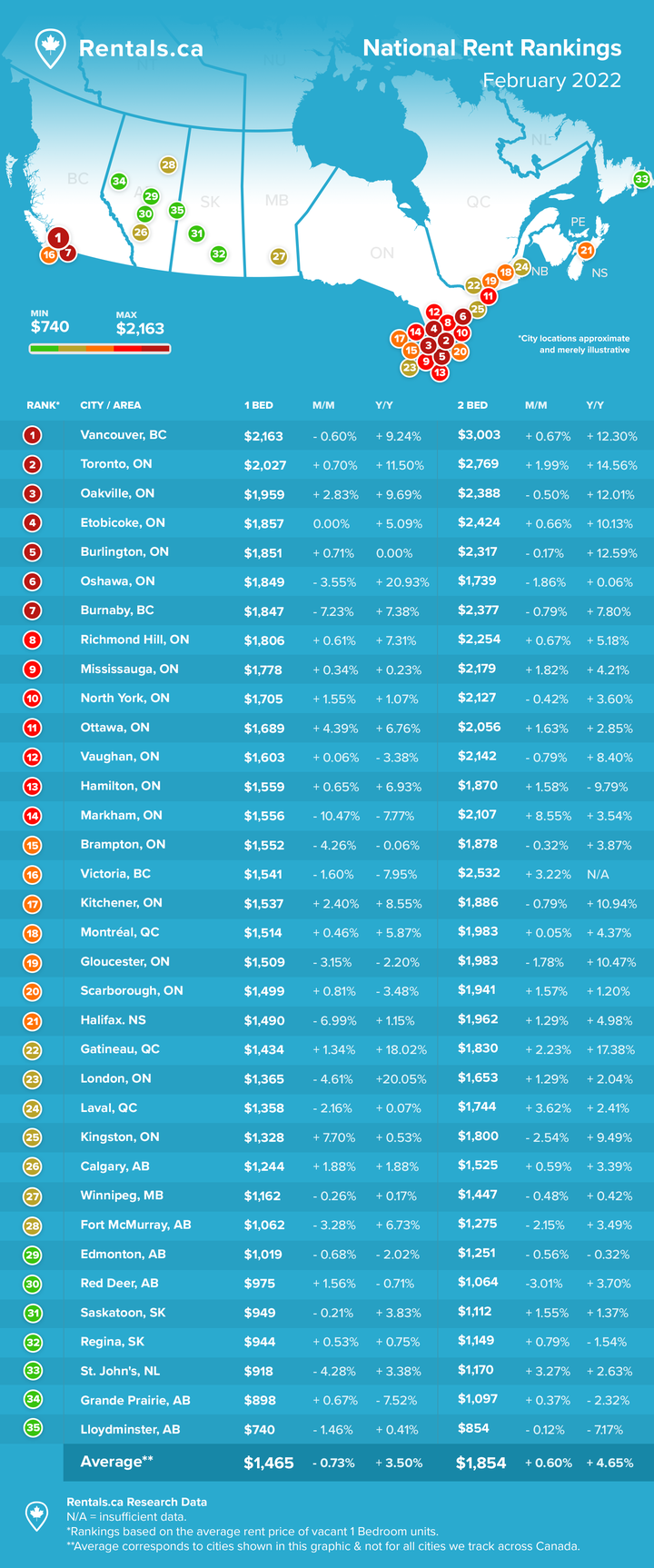

 The average rent for all Canadian properties listed on Rentals.ca in January was $1,807 per month, up 4.4 per cent annually and 1 per cent monthly, according to the Rentals.ca and Bullpen Research & Consulting latest National Rent Report.
The average rent for all Canadian properties listed on Rentals.ca in January was $1,807 per month, up 4.4 per cent annually and 1 per cent monthly, according to the Rentals.ca and Bullpen Research & Consulting latest National Rent Report.
The average rental rate in January remains below the $1,879 per month average in January 2020 and the $1,855 per month average in January 2019.
This is the fifth consecutive month average asking rents for all property types were positive year over year based on Rentals.ca listings, following 16 consecutive months of annual decline.
The rental market on a national basis peaked in late 2019, trended down through most of the early pandemic period of April 2020 to April 2021, and has generally trended up since that time.
After the typical seasonal decline in December, average rents in Canada are starting to trend up again.
The fear that the Omicron variant would derail the economy and lock down the country again has subsided, with tenants out looking for places to rent.

“January rents increased monthly in Canada, following a decrease in December, which we believe was just the typical seasonal decline, as opposed to Omicron fears,” said Ben Myers, president of Bullpen Research & Consulting. “However, the pandemic trend of much higher demand for larger properties continues, with average rental rates for single-family properties up 20% annually. The need for more space, a frothy resale market, future interest rate hikes, and the decoupling of workers from their place of employment remain key factors in the rise.”
Many municipalities across Canada are experiencing substantial annual increases in average rent, but remember average rents fell off a cliff during the worst of the pre-vaccine pandemic, so comparisons this year will skew high.
Vancouver has the most expensive rents in the country for all property types at $2,550 per month, an annual increase of 16.2 per cent year over year. Toronto was the next most expensive city at $2,317 per month, experiencing an annual increase of 14.5 per cent.
Gatineau and London experienced the largest annual increases in average rent. Gatineau increased 17.8 per cent to $1,657 per month, while London increased 17.2 per cent to $1,820 per month.
Other cities and areas with annual increases in average rent for all property types include: Etobicoke, up 12.4 per cent; Ottawa, up 5.1 per cent; Mississauga, up 5.1 per cent; Montreal, up 4.1 per cent; Saskatoon, up 4 per cent; Hamilton, up 3.9 per cent; Winnipeg, up 2.5 per cent and Calgary, up 2.3 per cent.
Only a handful of municipalities experienced annual decline in average rent. Scarborough saw the largest annual decline, decreasing 1.9 per cent to $1,848 per month.
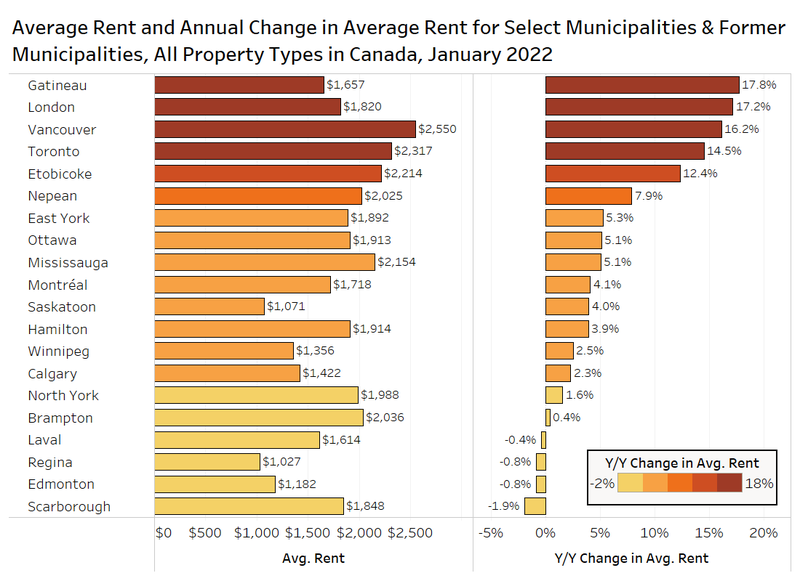
Toronto finished second on the list of 35 cities for average monthly rent in January for a one-bedroom at $2,027 and for a two-bedroom at $2,769.
Year over year, average monthly rent in January for a one-bedroom in Toronto was up 11.5 per cent and up 14.6 per cent for a two-bedroom. Month over month, average rent in Toronto was up 0.7 per cent for a one-bedroom and up 2 per cent for a two-bedroom.
Eleven other Greater Toronto Area (GTA) cities and areas are listed among the 35 cities in the report:
- Oakville finished third on the list of 35 cities and areas for average monthly rent in January for a one-bedroom home at $1,959 and fifth for average monthly rent for a two-bedroom at $2,388.
- Year over year, average monthly rent in January for a one-bedroom in Oakville was up 9.7 per cent and up 12 per cent for a two-bedroom.
- Etobicoke came in fourth on the list for average monthly rent in January for a one-bedroom home at $1,857 and fourth for average monthly rent for a two-bedroom at $2,424.
- Year over year, average monthly rent in January for a one-bedroom in Etobicoke was up 5.1 per cent and up 10.1 per cent for a two-bedroom.
- Burlington finished fifth on the list for average monthly rent in January for a one-bedroom home at $1,851 and seventh for average monthly rent for a two-bedroom at $2,317.
- Year over year, average monthly rent in Burlington for a one-bedroom is unchanged in January and up 12.6 per cent for a two-bedroom.
- Oshawa came in sixth on the list for average monthly rent in January for a one-bedroom home at $1,849 and 24th for average monthly rent for a two-bedroom at $1,739.
- Year over year, average monthly rent in January for a one-bedroom in Oshawa was up 20.9 per cent and up 0.1 per cent for a two-bedroom.
- Richmond Hill finished eighth on the list for average monthly rent in January for a one-bedroom home at $1,806 and for average monthly rent for a two-bedroom at $2,254.
- Year over year, average monthly rent in January for a one-bedroom in Richmond Hill was up 7.3 per cent and up 5.2 per cent for a two-bedroom.
- Mississauga came in ninth on the list for average monthly rent in January for a one-bedroom home at $1,778 and for average monthly rent for a two-bedroom at $2,179.
- Year over year, average monthly rent in January for a one-bedroom in Mississauga was up 0.2 per cent and up 4.2 per cent for a two-bedroom.
- North York finished 10th on the list for average monthly rent in January for a one-bedroom home at $1,705 and 11th for average monthly rent for a two-bedroom at $2,127.
- Year over year, average monthly rent in January for a one-bedroom in North York was up 1.1 per cent and up 3.6 per cent for a two-bedroom.
- Vaughan came in 12th on the list for average monthly rent in January for a one-bedroom home at $1,603 and 10th for average monthly rent for a two-bedroom at $2,142.
- Year over year, average monthly rent in January for a one-bedroom in Vaughan was down 3.4 per cent and up 8.4 per cent for a two-bedroom.
- Markham finished 14th on the list for average monthly rent in January for a one-bedroom home at $1,556 and 12th for average monthly rent for a two-bedroom at $2,107.
- Year over year, average monthly rent in January for a one-bedroom in Markham was down 7.8 per cent and up 3.5 per cent for a two-bedroom.
- Brampton came in 15th on the list for average monthly rent in January for a one-bedroom home at $1,552 and 19th for average monthly rent for a two-bedroom at $1,878.
- Month over month, average rent in Brampton was down 4.3 per cent for a one-bedroom and down 0.3 per cent for a two-bedroom.
- Scarborough finished 20th on the list for average monthly rent in January for a one-bedroom home at $1,499 and 17th for average monthly rent for a two-bedroom at $1,911.
- Year over year, average monthly rent in January for a one-bedroom in Scarborough was down 3.5 per cent and up 1.2 per cent for a two-bedroom.
Although not on the list, East York, average monthly rent in January for a one-bedroom home was $1,587, and average monthly rent for a two-bedroom was $2,118.
Also not on the list, York average monthly rent in January for a one-bedroom home was $1,748, and average monthly rent for a two-bedroom was $2,235.
In Toronto, average rent for single family homes was up from $3,073 per month in 2021 to $3,344 per month in January, up 8.8 per cent. Condo apartments have moved from $2,229 in 2021 to $2,533 in January, rising 13.6 per cent. Average rents for apartments increased from $2,027 per month in 2021 to $2,143 per month in January (+5.7 per cent).
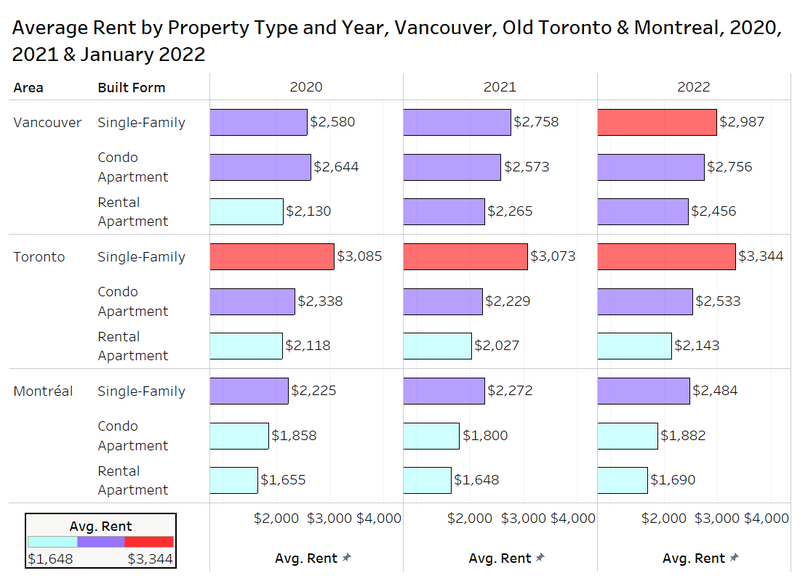
In Toronto, the downtown core was hit the hardest by the pandemic as the average per-square-foot rents declined at a quicker rate than the rest of the GTA. This premium has begun to widen again, with the average per-square-foot rents in Downtown Toronto increasing at a quicker rate than the rest of the GTA. Bullpen Research & Consulting expects this trend to continue moving forward, as tenants begin slowly returning to the office.
In January, the average rent per-square-foot for a condominium apartment in Downtown Toronto was $3.70. Since January 2021, the average rent per-square-foot has gradually moved up, increasing annually by 19 per cent. This follows an unprecedented single-year decline of 21 per cent January 2020 to January 2021.
The downtown market remains well below the rent levels from two years ago, with rents about 6 per cent below previous peak levels.
The rest of the GTA followed a similar pattern as Downtown Toronto, with the average rent per-square-foot steadily increasing throughout 2021 moving from $2.90 per square foot in January 2021 to $3.27 per square foot in January 2022 — an annual increase of 12.8 per cent. Rents outside the downtown core have now returned to pre-pandemic levels.
In January 2021, the average rent per-square-foot in Downtown Toronto was 7 per cent higher than the average rent per-square-foot in the rest of the GTA. In January 2022, this has since increased to 13 per cent. By comparison the gap in January 2019 was almost twice that rate at nearly 26 per cent.
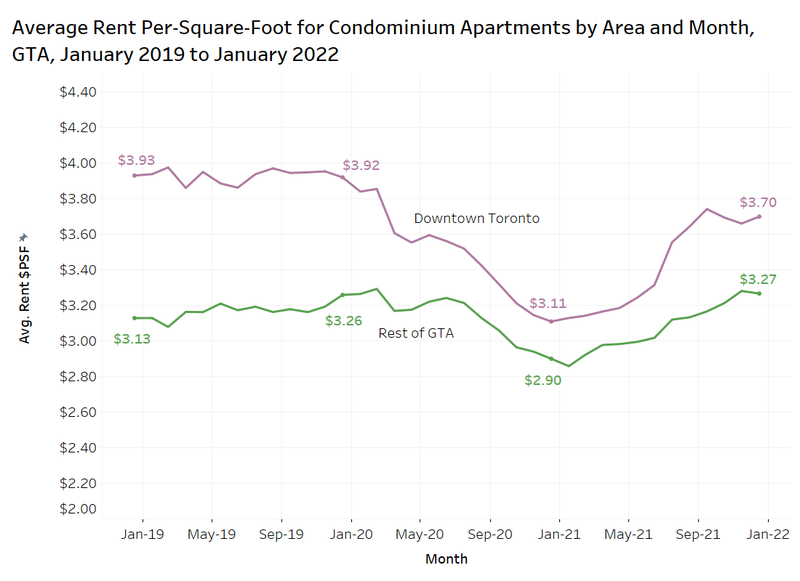
British Columbia and Ontario had the highest average rent at $2,181 and $2,110 respectively. Newfoundland and Saskatchewan had the lowest average rental rates at $969 and $1,026 per month respectively.
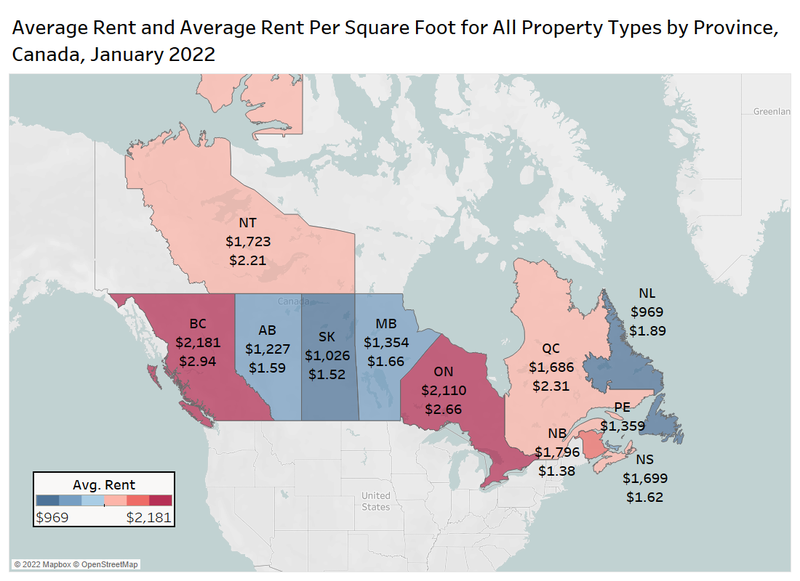
Other takeaways from the February National Rent Report include:
- The largest increases continue to be for single-family rentals, as many potential buyers choose to rent, because the ownership market has gotten too frothy. Potential government intervention in the ownership market and future interest rates hikes play into their decisions to rent. The average rent for a single-family home in January was $2,652, up nearly 20 per cent above last January’s average of $2,215. Average rent for condo rentals increased 13.8 per cent annually to $2,227, while apartment rents were up 2.1 per cent annually to $1,639 in January.
- Ontario had an average rent of $2,110 per month in January, showing an annual increase of 9.7 per cent. British Columbia had an average rent of $2,181 per month, showing an annual increase of 9.6 per cent, and Quebec had an average rent of $1,686 per month in January, an annual increase of 5.3 per cent. Alberta had an average rent of $1,227 per month, showing an annual decline of 1.3 per cent.
The National Rent Report charts and analyzes monthly, quarterly and annual rates and trends in the rental market on a national, provincial, and municipal level across all listings on Rentals.ca for Canada.
The Rentals.ca numbers show vacated properties that better reflect current values. The figures better represent the actual rents a potential tenant would encounter when seeking to rent a home.
